Urban Outfitters Bundle
Who Really Owns Urban Outfitters?
Understanding the Urban Outfitters SWOT Analysis begins with knowing who steers the ship. From its humble beginnings as a college-town shop to a global retail powerhouse, Urban Outfitters' ownership structure has profoundly shaped its trajectory. Discover the key players behind the URBN company and how their influence impacts its strategic decisions and market performance.
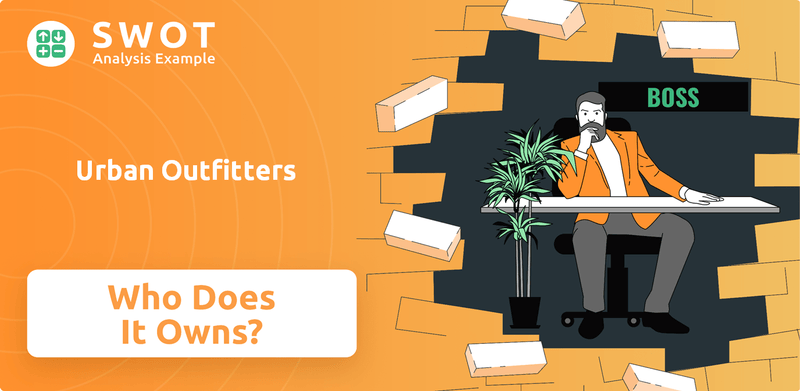
This exploration into Urban Outfitters ownership unveils a fascinating narrative of growth and transformation. We'll examine the evolution of its ownership, from its founders to the current major stakeholders, including the Anthropologie parent company and the Free People brand. Understanding the Urban Outfitters owner and its corporate structure is essential for investors and anyone interested in the company's financial performance and future direction, especially considering it's a publicly traded company.
Who Founded Urban Outfitters?
The story of Urban Outfitters begins in 1970, with its roots in a college entrepreneurship project. The company was founded by Richard 'Dick' Hayne, Judy Wicks, and Scott Belair. The initial concept, known as 'Free People,' was designed to cater to the student population near the University of Pennsylvania.
The first store, located near the university, offered a mix of second-hand clothing, furniture, jewelry, and home decor. This approach was designed to create a casual and inviting atmosphere for college students. Richard Hayne has remained a key figure, serving as CEO and Chairman, and continues to hold a significant ownership stake in the company.
The company's early success and expansion were driven by its ability to identify and cater to a specific demographic. By 1980, with sales around $3 million, the company had already expanded with a second store. This early vision of catering to a specific demographic through unique product offerings and store environments was reflected in the company's growth and expansion into new markets near colleges and urban centers.
The company, incorporated as Urban Outfitters, Inc. in 1976, has evolved significantly since its inception. Understanding the Growth Strategy of Urban Outfitters provides further insights into its development.
- Richard Hayne, a co-founder, has maintained a substantial ownership stake and leadership role.
- Meg Hayne, Dick Hayne's wife, played a crucial role in developing the private label division.
- Scott Belair transitioned to a career in finance after the company's initial success.
- Judy Wicks was also a key co-founder.
Urban Outfitters SWOT Analysis
- Complete SWOT Breakdown
- Fully Customizable
- Editable in Excel & Word
- Professional Formatting
- Investor-Ready Format
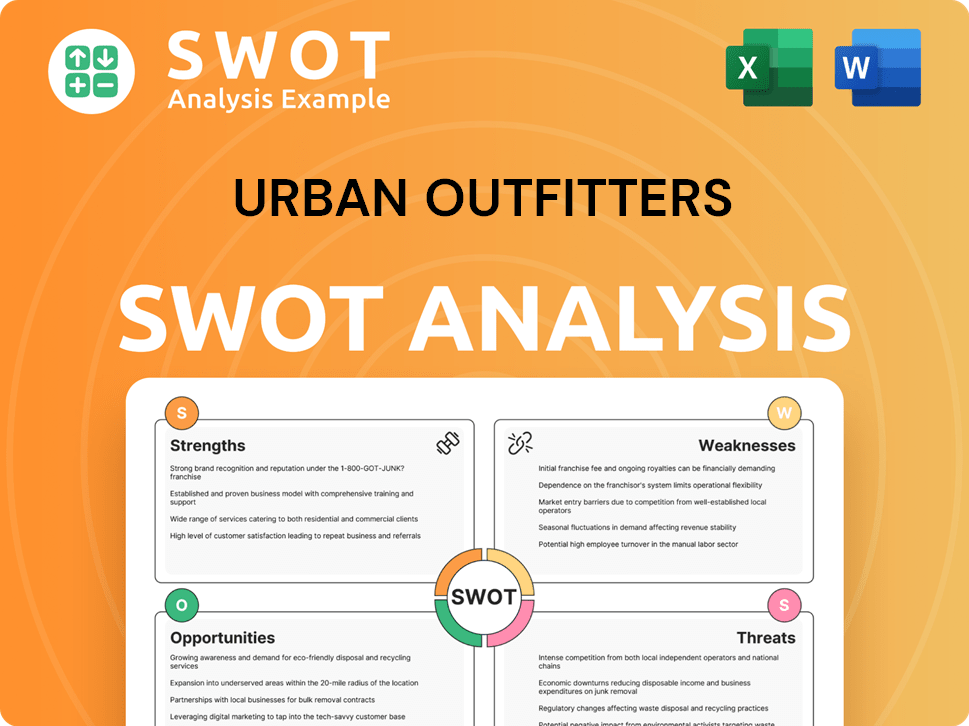
How Has Urban Outfitters’s Ownership Changed Over Time?
The evolution of Urban Outfitters's ownership structure began with its initial public offering (IPO) in 1993. This event marked a pivotal shift, transforming the company from a private entity to a publicly traded one listed on the NASDAQ under the ticker symbol URBN. The IPO raised over $13 million, which was crucial for funding the company's expansion through new store openings and the growth of its wholesale division. This strategic move laid the foundation for its future growth and market presence.
As of June 9, 2025, the stock price was at $69.71 per share, a significant increase from $42.70 on June 10, 2024. The current ownership of the URBN company is a mix of institutional investors, insiders, and public and individual investors. Data from TipRanks indicates that institutional investors hold approximately 42.30%, insiders hold 34.18%, and public companies and individual investors hold 23.52% of the stock. However, as of May 2025, institutional investors held 76.25% and mutual funds held 56.33%, while insiders decreased their holdings to 20.56%.
| Ownership Category | Percentage of Ownership (Approximate) | As of |
|---|---|---|
| Institutional Investors | 42.30% (TipRanks) / 76.25% (May 2025) | June 9, 2025 / May 2025 |
| Insiders | 34.18% (TipRanks) / 20.56% (May 2025) | June 9, 2025 / May 2025 |
| Public Companies and Individual Investors | 23.52% | June 9, 2025 |
Richard A. Hayne, co-founder and CEO, remains the largest individual shareholder, owning 55.10 million shares, which represents 59.47% of the company as of 2025, with a value of $3.84 billion. Key institutional shareholders include BlackRock, Inc., Vanguard Group Inc, and Dimensional Fund Advisors Lp. BlackRock, Inc. held 9,670,983 shares as of March 31, 2025, representing 10.4% ownership. Vanguard Group Inc held 7,811,762 shares and Dimensional Fund Advisors Lp held 4,387,011 shares as of March 31, 2025. This structure, combining founder leadership with significant institutional investment, shapes the company's strategic direction and governance.
The ownership of Urban Outfitters is diverse, with a mix of institutional investors, insiders, and public shareholders. Richard A. Hayne, the co-founder and CEO, is the largest individual shareholder.
- The company is publicly traded on the NASDAQ.
- Institutional investors hold a significant portion of the shares.
- Hayne's substantial ownership reflects his continued influence.
- The ownership structure impacts the company's strategic decisions.
Urban Outfitters PESTLE Analysis
- Covers All 6 PESTLE Categories
- No Research Needed – Save Hours of Work
- Built by Experts, Trusted by Consultants
- Instant Download, Ready to Use
- 100% Editable, Fully Customizable
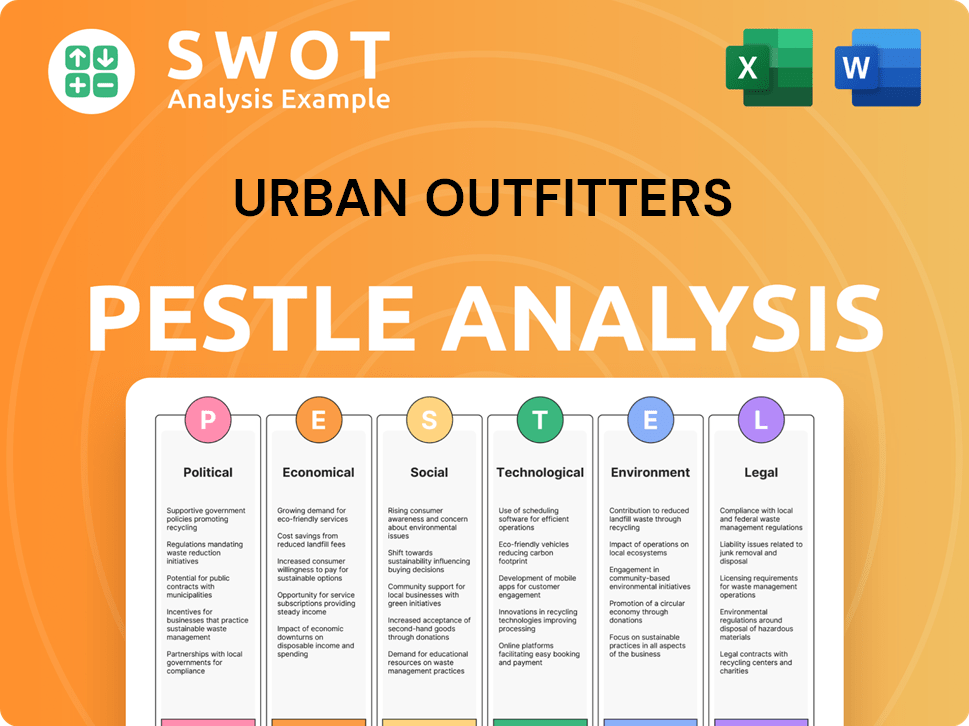
Who Sits on Urban Outfitters’s Board?
The current Board of Directors of the company, as of April 1, 2025, consists of ten directors. These directors are elected annually by a majority vote of the shareholders. The company aims to have a substantial majority of independent directors on its board to ensure unbiased oversight and decision-making. The nominees for re-election to the Board include Edward N. Antoian, Kelly Campbell, Harry S. Cherken, Jr., Mary C. Egan, Margaret A. Hayne, Richard A. Hayne, Amin N. Maredia, Wesley S. McDonald, Todd R. Morgenfeld, and John C. Mulliken. The company's commitment to independent oversight is reflected in the fact that eight of these nominees meet the criteria for independence under NASDAQ listing standards.
Richard A. Hayne, a co-founder, serves as the Chairman and Chief Executive Officer. Margaret A. Hayne, his spouse, is the Co-President and Chief Creative Officer, also serving on the board. While the company generally follows a one-share-one-vote structure, Richard Hayne's significant ownership, holding nearly 60% of the shares, grants him considerable influence over the company's strategic direction and operational decisions. The Nominating and Governance Committee plays a crucial role in recommending director candidates and annually reviewing committee assignments. The board's responsibilities encompass overseeing management, business affairs, long-term strategy, and risk management. Directors are required to maintain a minimum share ownership, holding the lesser of 15,000 shares or shares equal to three times their annual cash compensation. They must retain 50% of all net shares that vest until this requirement is met.
| Director | Title | Independent |
|---|---|---|
| Richard A. Hayne | Chairman and CEO | No |
| Margaret A. Hayne | Co-President and Chief Creative Officer | No |
| Edward N. Antoian | Director | Yes |
| Kelly Campbell | Director | Yes |
| Harry S. Cherken, Jr. | Director | Yes |
| Mary C. Egan | Director | Yes |
| Amin N. Maredia | Director | Yes |
| Wesley S. McDonald | Director | Yes |
| Todd R. Morgenfeld | Director | Yes |
| John C. Mulliken | Director | Yes |
The board's composition and the significant ownership stake held by Richard Hayne are key aspects of the Urban Outfitters owner structure. This structure influences the company's strategic decisions and operational oversight. For further insights into the company's business model and revenue streams, you can explore the details in this article: Revenue Streams & Business Model of Urban Outfitters.
Understanding the Urban Outfitters ownership structure is essential for investors and stakeholders.
- The board is composed of ten directors, with a majority being independent.
- Richard Hayne's significant ownership gives him considerable control.
- The Nominating and Governance Committee oversees director nominations and committee assignments.
- The board manages the company's strategic direction and risk.
Urban Outfitters Business Model Canvas
- Complete 9-Block Business Model Canvas
- Effortlessly Communicate Your Business Strategy
- Investor-Ready BMC Format
- 100% Editable and Customizable
- Clear and Structured Layout
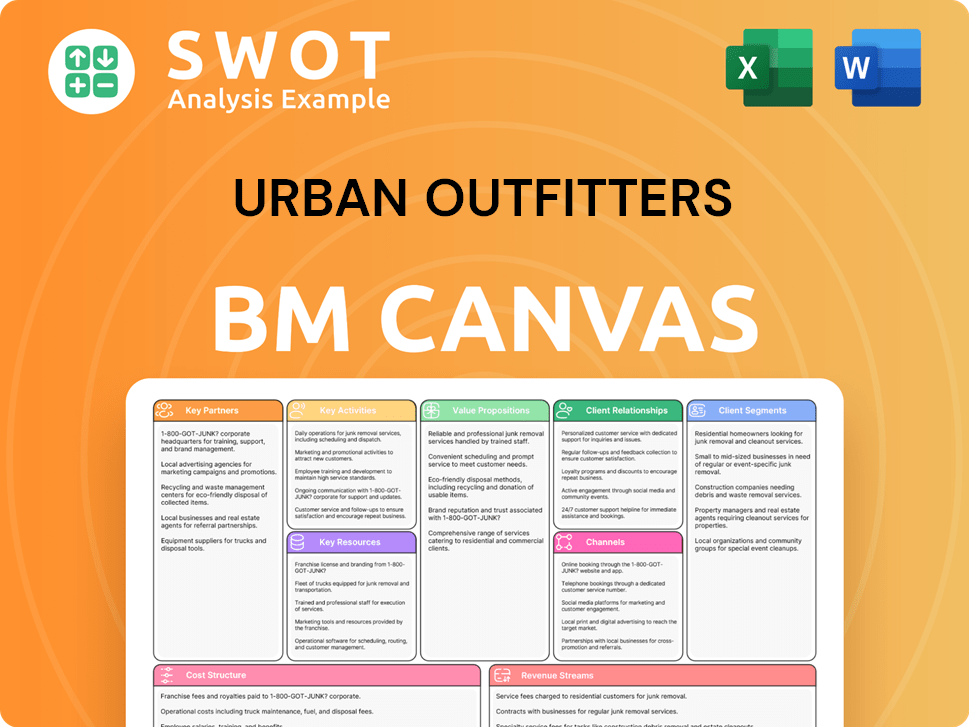
What Recent Changes Have Shaped Urban Outfitters’s Ownership Landscape?
Over the past few years, the parent company of Urban Outfitters, URBN, has been adapting to the changing retail environment. For the three months ending April 30, 2025, the company saw record first-quarter revenues and profits. This was driven by positive sales growth and improved profitability across all its brands. As of June 9, 2025, institutional investors held a significant portion of the company, with 720 institutional owners holding a total of 82,269,508 shares.
In fiscal year 2025, which ended January 31, 2025, URBN achieved record sales of $1.6 billion in the fourth quarter, a 10% year-over-year increase. Earnings per share rose by 51% year-over-year to $1.04. The company's commitment to sustainability is also evident, with 84% of the energy used in operations and stores coming from renewable sources since January 2024. This reflects the growing importance of environmental, social, and governance (ESG) factors for both corporate strategy and investor interest. The strong performance of brands like Anthropologie and Free People has been key to driving overall growth for the company.
| Metric | Q4 FY25 | Year-over-Year Change |
|---|---|---|
| Sales | $1.6 billion | +10% |
| Earnings per Share | $1.04 | +51% |
| Gross Margin | 32.3% | +300 basis points |
The company's future plans include opening 58 new stores and closing 19 underperforming locations. The Nuuly subscription rental service is a key growth area, with a 50% increase in subscribers during Q4 FY25. The company's focus on brands like Anthropologie and Free People, along with the growth of Nuuly, highlights its strategic approach to maintaining a competitive edge. To understand how URBN competes in the market, it's useful to look at the Competitors Landscape of Urban Outfitters.
Urban Outfitters is a publicly traded company. The majority of its shares are held by institutional investors, including major firms like BlackRock and Vanguard.
The ownership structure of Urban Outfitters is primarily composed of institutional investors. Insider ownership, while present, represents a smaller percentage of the total shares.
Anthropologie is part of the URBN company, which also includes brands like Free People and the Nuuly subscription service. This diversified portfolio supports the overall company's financial performance.
Free People is another key brand within the URBN portfolio. Its performance, along with Anthropologie and Nuuly, contributes to the company's overall success and growth strategy.
Urban Outfitters Porter's Five Forces Analysis
- Covers All 5 Competitive Forces in Detail
- Structured for Consultants, Students, and Founders
- 100% Editable in Microsoft Word & Excel
- Instant Digital Download – Use Immediately
- Compatible with Mac & PC – Fully Unlocked
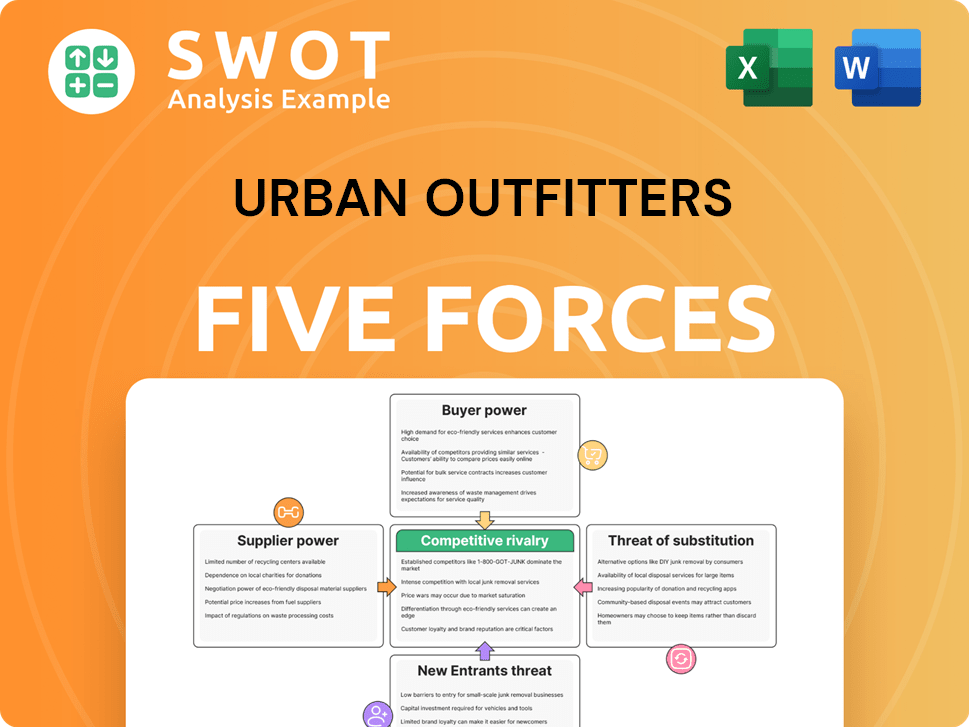
Related Blogs
- What are Mission Vision & Core Values of Urban Outfitters Company?
- What is Competitive Landscape of Urban Outfitters Company?
- What is Growth Strategy and Future Prospects of Urban Outfitters Company?
- How Does Urban Outfitters Company Work?
- What is Sales and Marketing Strategy of Urban Outfitters Company?
- What is Brief History of Urban Outfitters Company?
- What is Customer Demographics and Target Market of Urban Outfitters Company?
Disclaimer
All information, articles, and product details provided on this website are for general informational and educational purposes only. We do not claim any ownership over, nor do we intend to infringe upon, any trademarks, copyrights, logos, brand names, or other intellectual property mentioned or depicted on this site. Such intellectual property remains the property of its respective owners, and any references here are made solely for identification or informational purposes, without implying any affiliation, endorsement, or partnership.
We make no representations or warranties, express or implied, regarding the accuracy, completeness, or suitability of any content or products presented. Nothing on this website should be construed as legal, tax, investment, financial, medical, or other professional advice. In addition, no part of this site—including articles or product references—constitutes a solicitation, recommendation, endorsement, advertisement, or offer to buy or sell any securities, franchises, or other financial instruments, particularly in jurisdictions where such activity would be unlawful.
All content is of a general nature and may not address the specific circumstances of any individual or entity. It is not a substitute for professional advice or services. Any actions you take based on the information provided here are strictly at your own risk. You accept full responsibility for any decisions or outcomes arising from your use of this website and agree to release us from any liability in connection with your use of, or reliance upon, the content or products found herein.